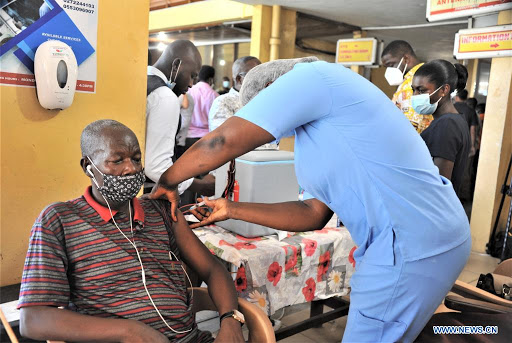COVID-19 vaccine shortages have disrupted global supply efforts and halted rollouts in several countries including Ghana.
According to the World Health Organization (WHO), Africa has the world’s lowest COVID-19 vaccination rate. The delay in vaccination has become a major concern as some recipients of the first dose of the AstraZeneca vaccine, continue to wait for the second dose well beyond the recommended wait period.
Research has shown the AstraZeneca jab generates the strongest immune response when given 12 weeks apart. So, will any further delay affect the effectiveness of the vaccine?
Two-pronged crisis
Ghana is battling a third wave of COVID-19 infections and the country has also halted vaccine rollouts due to shortages.
As at July 30, Ghana’s total active COVID-19 cases stood at 6,276 and 844 deaths.
According to the health agency managing the deployment of the vaccines, Ghana Health Service (GHS), 405,971 people have been fully vaccinated, while a total of 865,422 persons are yet to receive their second dose.
Meanwhile, the Director-General of GHS, Dr Patrick Kuma-Aboagye, said Ghana will soon take delivery of 250,000 doses of AstraZeneca vaccines to inoculate those waiting for their second doses.
What happens if your second dose delay?
“There is no complication if you go beyond your time for the second dose,” Programme Manager, Expanded Programme on Immunization of the Ghana Health Service (GHS), Dr Kwame Amponsa-Achiano, told GhanaFact.
“For vaccines, what we know scientifically is that we have a minimum interval, we also have an optimum interval but we do not have a maximum interval,” he said.
Explaining this further, Dr Amponsa-Achiano said “the first dose gives some protection for some time then the protection starts reducing. The best time as of now to give the second dose is around 12 weeks or soon after. If it goes beyond, it does not mean that there is any complication, it only tells us that if we wait too long the protection will go down not as if it’s even going to zero.”
“We do know that antibody levels slowly wane for up to 6 months after the first dose is given so we do not expect a sudden drop in protection after 12 weeks. It is very important to get the second dose to get maximum protection over time,” the WHO told GhanaFact when contacted via the Africa Infodemic Response Alliance (AIRA) secretariat.
There should be no complications due to a delay in getting the second dose, but being fully vaccinated with two doses of the AstraZeneca vaccines will provide greater protection against the virus, the WHO emphasized.
“The reason why we say 12 weeks is that that is the duration of time for us to have data. Most data on AstraZeneca in terms of the antibodies and everything is coming from the UK. And most people in the UK because they have supplies, didn’t have to go beyond the 12 or 16 weeks without getting a second dose. That’s where the data ends,” a Research Fellow in the Department of Health Policy and Management at New York University’s School of Global Public Health Nana Kofi Quakyi explains to GhanaFact.
According to him, figuring out the effectiveness of the single-dose beyond the 12 weeks to 16 weeks should be a follow-up study for any Public Health Service facing such challenges.
“The issue is that we don’t know specifically what those timelines are and because we don’t know, the moral obligation on the public health service in any country that is facing that problem is to do a follow-up study. So, all people or some number of them who are missing that 12-week should be in a study,” he said.
Ghana is expected to take delivery of 1.2 million doses of Pfizer from the US through COVAX, a channel established to ensure even distribution of the COVID-19 vaccines and about 17 million doses of Johnson and Johnson in August.
By: Gifty Tracy Aminu





